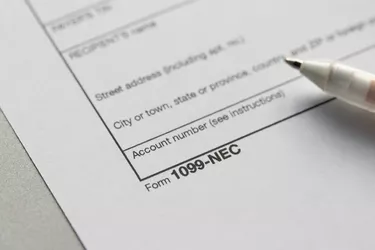
Not all workers are created equal, and the differences between them can play a critical role in your small business's finances. Workers can be employees or they may be independent contractors, and there's no single hard, firm line to differentiate them, according to the Society for Human Resource Management. Employers have to look at and gauge the overall picture, but they can ask the IRS for help.
Why Does It Matter?
Video of the Day
Using an independent contractor rather than hiring an employee can save a small business a good bit of money and aggravation. You must income tax withholding of federal taxes, including income tax, Social Security tax and Medicare tax, from an employee's pay and forward those amounts to the government on their behalf. Your business must match those Social Security and Medicare taxes. Your employee pays one half and you pay the other. You must also pay an unemployment tax for employees.
Video of the Day
Employees are also afforded certain protections by the Fair Labor Standards Act with regard to overtime, minimum wage and workers' compensation benefits, according to the U.S. Department of Labor.
Independent contractors aren't subject to any of these rules. They must pay the self-employment tax: both halves of those payroll taxes comprised of Social Security and Medicare taxes. Your business isn't responsible for withholding anything for tax purposes from the money you pay them.
Who Controls the Worker’s Labor?
The IRS cites behavioral control over a worker as one of the more pivotal factors in differentiating between an employee and an independent contractor. A worker is most likely an employee if your degree of control includes when and how they work and what they're assigned to do while they're on the clock.
Let's say you want Sam to build you a website and manage it. Sam is an employee if he must report to a certain location to perform this job and if he must remain on premises for a set period of hours that you determine. Sam is an independent contractor if he decides to work on your website at 3 a.m. if he's not too tired. Tax law calls this the "right-to-control" test, according to the Department of Health and Human Services.
Who Controls Pay?
Your worker is an employee if you decide how much you're going to pay them, when you're going to do it and whether you offer them reimbursement for expenses. Sam the website manager will tell you how much you'll have to pay if you want his service.
An employee is economically dependent on you. An independent contractor is not. They most likely have several clients and work as a freelancer. Communications Workers of America points out that they charge each of them per service performed. An employee might be paid hourly, weekly, biweekly or monthly, and the timing is up to you.
Employees
- Work where and when and on what you tell them to
- You control pay
- You provide benefits
- Usually work for an open-ended period
Independent Contractors
- Perform services for you when and where they choose, but usually by a set deadline
- Will tell you their fee for services rendered
- Do not receive business-related benefits
- Work for you only until the paid-for project is completed
What’s Your Relationship?
You likely have an employer-employee relationship if you provide the equipment or tools they use. You might offer them employee benefits such as sick pay, vacation pay, retirement benefits or health insurance. Not so with an independent contractor.
Your employment relationship with an employee is typically open-ended. They'll work for you until they quit, they're fired, or until a certain date specified by you. Your relationship with an independent contractor ends when the service or job they're performing for you is completed.
An employee is economically dependent on you. An independent contractor is not.
If You Get It Wrong
It might be tempting to tag your delivery driver as an independent contractor, but misclassification can get you in hot water. The Internal Revenue Service will tap you on the shoulder and demand all those FICA taxes (Social Security and Medicare taxes) that you didn't pay if you don't have a reasonable excuse for not doing so.
The Wage and Hour Division of the Department of Labor will step in to investigate if someone who is rightfully an employee files a complaint that they've been denied the appropriate benefits.
The Government Stands by to Help
The government offers various options if you're an employee or employer who just can't identify which side of the fence you or a worker falls on. It's basically just a matter of filing a tax form.
The Internal Revenue Service suggests filing Form SS-8 if you're a business owner and you're just not sure where you stand with a certain worker. Individuals who are being paid as independent contractors can file this form as well. The agency will decide the matter based on the details of your situation.
Employees can also file Form 8919 with the IRS to reclaim their half of those FICA taxes if the agency determines that they are indeed an employee but have been paid as an independent contractor.
- IRS: Independent Contractor (Self-Employed) or Employee?
- U.S. Department of Labor Wage and Hour Division: Misclassification of Employees as Independent Contractors
- IRS: Worker Classification 101: Employee or Independent Contractor
- U.S. Department of Health and Human Services: What’s the Difference Between an Independent Contractor and an Employee?
- Society for Human Resource Management: Employing Independent Contractors and Other Gig Workers
- Communications Workers of America: My Employer Says I Am an Independent Contractor. What Does This Mean?